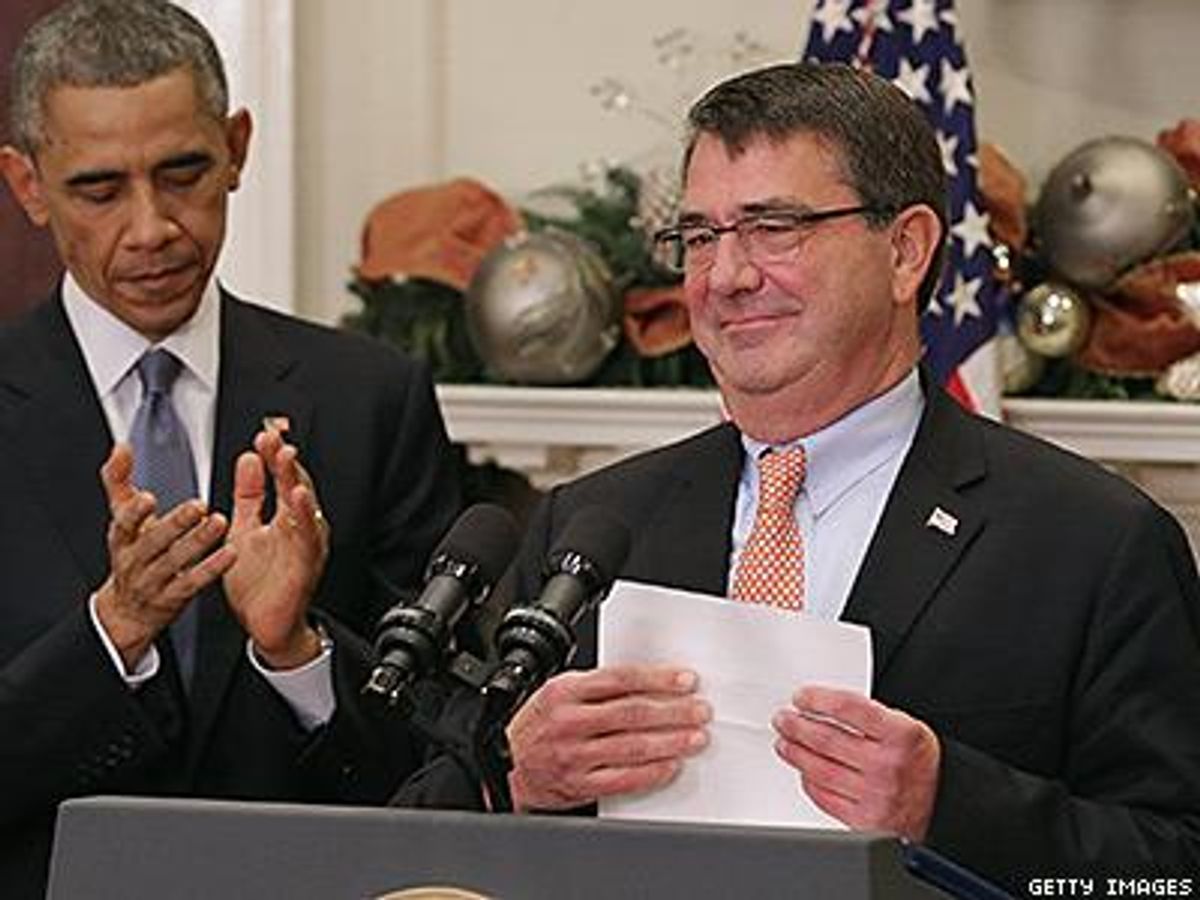Dear Dr. Carter,
First things first: Congratulations on your recent nomination to become the 25th United States Secretary of Defense. On behalf of over 85,000 LGBT people proudly serving in uniform today, we're excited at the prospect of having someone with your impeccable qualifications at the helm.
And they are indeed impeccable: degrees in physics and medieval history from Yale (summa cum laude, Phi Beta Kappa); a doctorate in theoretical physics from Oxford (where you were a Rhodes Scholar); stints on the faculty at Harvard and Stanford; 11 books and dozens of scholarly articles under your name. If confirmed, you'll probably be one of the smartest men ever to fill the post.
Choosing to put that intellect to work for our nation's defense, you've led some of America's most important strategic initiatives: from leading military planning during the 1994 North Korean nuclear crisis to managing the Defense Department's entire research and development program. For over two years you were Secretary Chuck Hagel's deputy -- the number 2 man at the Pentagon. Your national security credentials are unparalleled, leaving little doubt you're the right person for the job.
That said, I'll be honest: You've got some pretty big shoes to fill.
Chuck Hagel brought something to the job of Defense secretary that no one else ever has: experience as a noncommissioned officer leading troops in combat. The lessons then-sergeant Hagel learned as an infantry squad leader in Vietnam -- lessons written in mud, blood, sweat, and tears -- informed the way he led the force as SECDEF. More than anything else, it was those lessons that made him the right person to lead our newly gay-, lesbian-, and bisexual-inclusive military.
Serving as an infantryman in Vietnam taught Sergeant Hagel that the most important thing about a soldier is simply how well they do their job. When your life depends on the person in the foxhole next to you, what matters most isn't the color of their skin or what language their parents speak. It's how well they can shoot, how much of their first aid training they remember, and whether they can keep their heads when the bullets start flying.
So when Secretary Hagel said things like, "Every qualified American who wants to serve our country should have the opportunity," you knew he meant it -- because he understood that the best person for the job was the person who was there to serve.
Hagel said those words, incidentally, in response to a question about transgender service members, 15,000 of whom serve in our military today. Obsolete medical regulations -- some of which date from when he was Sergeant Hagel -- label them as unfit for duty and force these men and women to serve in silence. Not a week goes by that a transgender member of our armed forces isn't summarily dismissed from service. It's costing you trained, experienced, and dedicated troops, it's costing the taxpayers millions, and it's costing these troops their careers.
Earlier this year, Secretary Hagel made a commitment to his transgender soldiers, sailors, airmen, and Marines to review the regulations unfairly barring them from serving. If you're fortunate, Dr. Carter, he'll make good on that promise and order the review prior to your confirmation. It will likely fall to you, however, to bring it to its conclusion.
To do so, you'll need to rely on the exhaustive research on the topic conducted over the last two years -- research that has found there is "no compelling medical reason" to bar transgender people from military service. You'll want to study the experiences of our closest allies, over a dozen of whom already allow transgender people to serve openly. You'll need to hear from your subordinate leaders -- people like Air Force Secretary Deborah Lee James, who recently expressed support for review and echoed Hagel's commitment, saying "Anyone who is capable of accomplishing the job should be able to serve." And you'll want to call on some of America's over 130,000 transgender veterans, many of whom would be honored to offer their service again to help bring DOD policies up to date.
Most importantly, you'll need to think strategically about how to most effectively integrate transgender service members into the force when the review is complete. You'll want to take a close look at finally updating the DOD's nondiscrimination and equal opportunity policies to include LGBT service members. And I know you'll be keeping a close eye on the services' ongoing integration of women into combat roles, which is good. As you've likely already figured out, the long-term success of each of these inclusion initiatives is closely linked to that of the others.
When the day comes that you are able to shake the hands of some of the first openly transgender members of the U.S. military -- when you're able to meet them, hear their stories, and get to know them as I have -- you'll know you di d the right thing, Dr. Carter. Because they are some of the finest, most courageous, and most selfless people I have ever known, and America is blessed to have them standing at her gates.
d the right thing, Dr. Carter. Because they are some of the finest, most courageous, and most selfless people I have ever known, and America is blessed to have them standing at her gates.
I hope you have that honor, sir.
Most sincerely,
Allyson Dylan Robinson
Former Army Captain
West Point Class of 1994


 d the right thing, Dr. Carter. Because they are some of the finest, most courageous, and most selfless people I have ever known, and America is blessed to have them standing at her gates.
d the right thing, Dr. Carter. Because they are some of the finest, most courageous, and most selfless people I have ever known, and America is blessed to have them standing at her gates.









































































